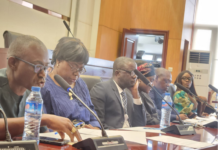The Government of Liberia has agreed to a request from the United States to temporarily receive Kilmar Armando Abrego Garcia, a Salvadoran national at the center of a contentious deportation case that has drawn scrutiny from human rights advocates and legal experts in the U.S.
The decision follows a notification from the U.S. Department of Homeland Security (DHS) to a federal court indicating that Liberia had consented to accept Abrego Garcia. The U.S. Department of Justice (DOJ) confirmed in a court filing on Friday that DHS had secured “diplomatic assurances regarding the treatment of third-country individuals removed to Liberia” and was finalizing arrangements for the transfer, which could occur as early as October 31.
Abrego Garcia, who had been residing in Maryland with his wife and children, was deported in March to El Salvador’s high-security CECOT prison, despite a 2019 court order prohibiting his removal to that country due to credible fears of persecution.
The Trump administration had previously alleged that he was affiliated with the MS-13 gang—an accusation his legal team and family have consistently denied.
In June, U.S. authorities returned Abrego Garcia to the United States to face human smuggling charges in Tennessee, to which he pleaded not guilty. He was later released into the custody of his brother in Maryland but was subsequently re-detained by immigration officials. He is currently being held in Pennsylvania as legal proceedings continue. U.S. District Judge Paula Xinis has issued a temporary injunction preventing his removal from the country.
Liberia Cites Humanitarian Grounds for Acceptance
In a statement released Friday, the Liberian government confirmed it had received a formal request from the United States and agreed to accept Abrego Garcia “strictly on humanitarian and temporary grounds.”
“This decision was reached after extensive consultations with relevant national and international stakeholders, reflecting Liberia’s enduring commitment to upholding the principles of human dignity, international solidarity, and compassion in times of distress,” the statement read.
Liberia emphasized that the move aligns with its longstanding tradition of offering refuge to individuals in need, including African freedom fighters and democracy advocates. The government framed the decision as part of its broader commitment to international cooperation and humanitarian law.
Conditions and Safeguards
The Ministry of Foreign Affairs outlined several conditions under which Abrego Garcia would be received:
Security Screening: Comprehensive vetting by Liberian authorities prior to and upon arrival.
Human Rights Protections: Full respect for due process and access to legal protections in line with international obligations.
Non-Refoulement: Assurance that Abrego Garcia will not be returned to any country where he faces a credible risk of persecution or harm.
International Coordination: Engagement with the United Nations and other partners to explore long-term solutions, including potential resettlement or lawful transfer.
The government stressed that the arrangement was made “voluntarily, in good faith, and solely on humanitarian grounds,” reaffirming the historic ties between Liberia and the United States, rooted in shared values of justice and human rights.
This development comes amid broader U.S. efforts to negotiate agreements with African nations to accept deportees and migrants as part of its evolving immigration and foreign policy strategy.























